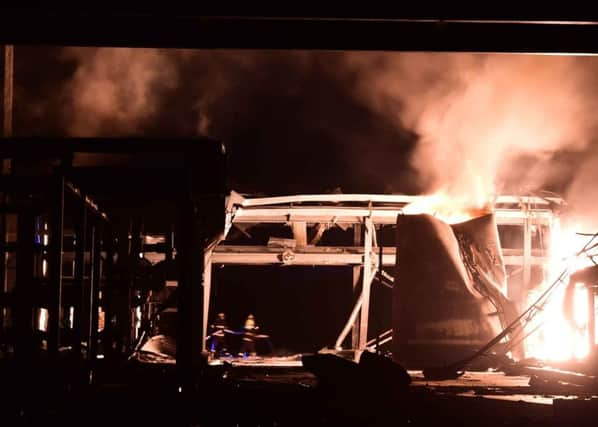Second chemical blast raises fears in China


The explosion occurred just before 9pm on Saturday in Zibo, a city southeast of Beijing in Shandong province.
Firefighters put out the resulting fire just before 2am local time yesterday.
Advertisement
Hide AdAdvertisement
Hide AdLocal reports said one person working at the facility had been killed, and that the cause of the blast was under investigation.
After the blast, “white sticky stuff” fell from the sky and the local environmental protection department sent monitoring equipment to test air quality.
But environmental authorities said they detected no contamination from the blast.
The blast shattered windows in homes less than a mile away and sent shock waves that could be felt for at least three miles.
Within minutes of the blast, photos and videos of a fire set off by the blast appeared on Chinese social media, with many people complaining about the chemical factories in their midst and the pollution such plants produce.
“There are too many chemical plants here, countless,” wrote a user who said he lived in Zibo. “The air is unbreathable and the water is undrinkable.”
The plant, owned by Shandong Runxing Chemical Technology Co, produced adiponitrile, which can give off toxic fumes when burned. It is used in making nylon and other products.
The blast followed the blast on 12 August at a warehouse containing chemicals in Tianjin, a port city east of Beijing.
Advertisement
Hide AdAdvertisement
Hide AdYesterday, the Tianjin city government announced on its microblog account that the death toll in that disaster had been raised to 123. It said 50 people were still missing.
The cause of the that disaster is under investigation. Chinese state media say the warehouse, which stored sodium cyanide and other dangerous chemicals, was too close to homes and that its operators may have obtained falsified safety approvals.
The disaster raised concerns about the effectiveness of China’s regulatory bodies and their ability to oversee industries in which they or officials might have an interest.
The executives of the company that owns the warehouse at the centre of the Tianjin explosions have admitted using their political connections to skirt safety regulations that prohibit the storage of hazardous chemicals too close to residential areas.
The company was storing at least 2,500 tons of hazardous chemicals at the warehouse when it caught fire.
According to state media, firefighters were unaware that some of the chemicals can ignite upon contact with water. The resulting explosions killed dozens of firefighters.